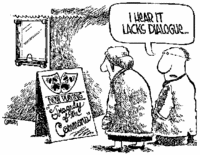 There’s lots of academic and commercial effort put into stopping software and other intellectual property piracy, especially for videos. A form of risk management, I suppose, but one that ignores the much bigger risk to traditional intellectual property
of causing political blowback such as what just happened in Sweden:
There’s lots of academic and commercial effort put into stopping software and other intellectual property piracy, especially for videos. A form of risk management, I suppose, but one that ignores the much bigger risk to traditional intellectual property
of causing political blowback such as what just happened in Sweden:
“Together, we have today changed the landscape of European politics. No matter how this night ends, we have changed it,” Falkvinge said. “This feels wonderful. The citizens have understood it’s time to make a difference. The older politicians have taken apart young peoples’ lifestyle, bit by bit. We do not accept that the authorities’ mass-surveillance,” he added.Funny thing about what happens when the majority of the population participates in an illegal activity: eventually it’s not illegal anymore.
At least partially, The Pirate Party puts its increased popularity down to harsh copyright laws and the recent conviction of the people behind The Pirate Bay. After the Pirate Bay verdict, Pirate Party membership more than tripled and they now have over 48,000 registered members, more than the total number of votes they received in 2006.Many of those abuses of power probably already are illegal; the appropriate laws just aren’t being enforced. We saw this during alcohol prohibition in the U.S., and we see it now with marijuana prohibition in the U.S. The first prohibition ended, the second probably will, and meanwhile, online “piracy” is on its way to being redefined.With their presence in Brussels, the Pirate Party hopes to reduce the abuses of power and copyright at the hands of the entertainment industries, and make those activities illegal instead. On the other hand they hope to legalize file-sharing for personal use.
-jsq
